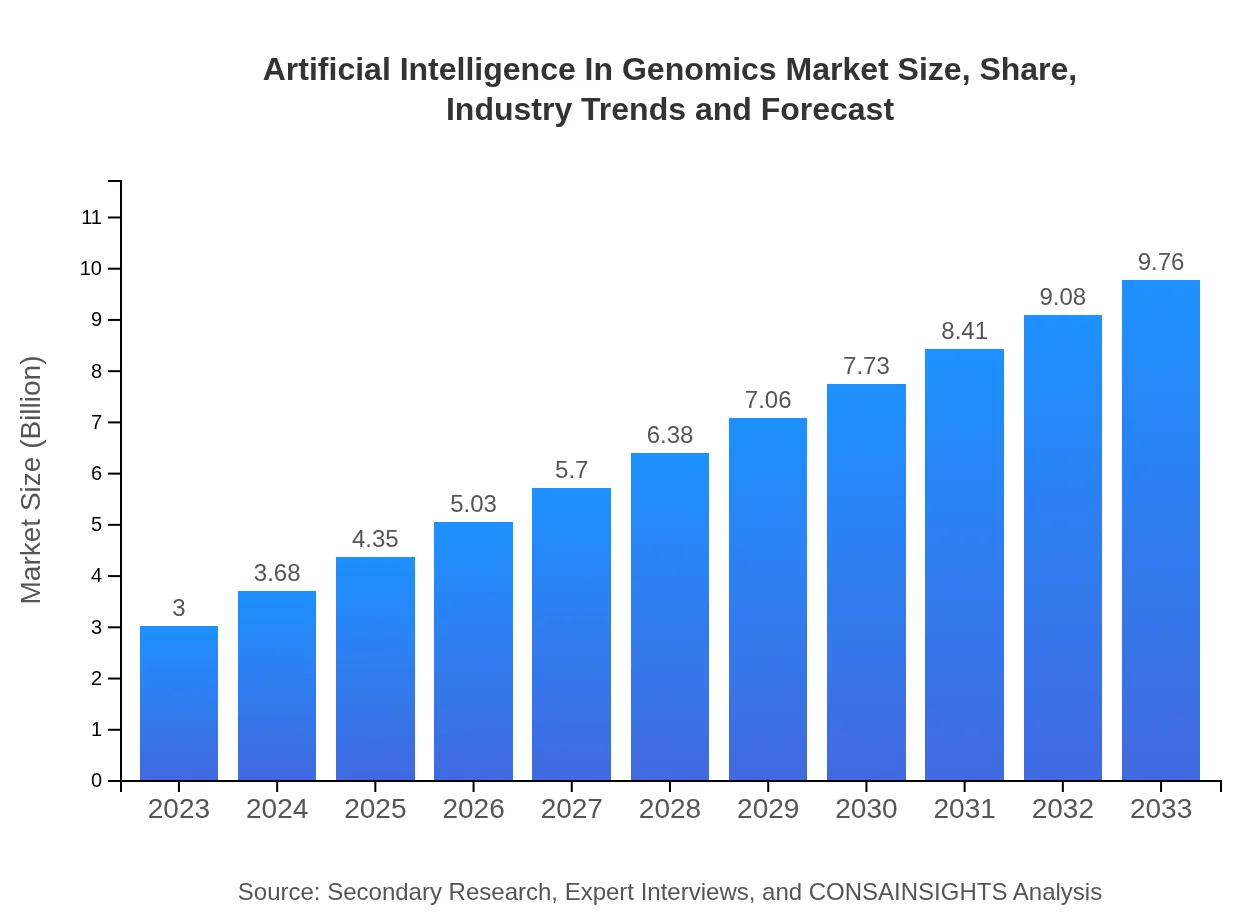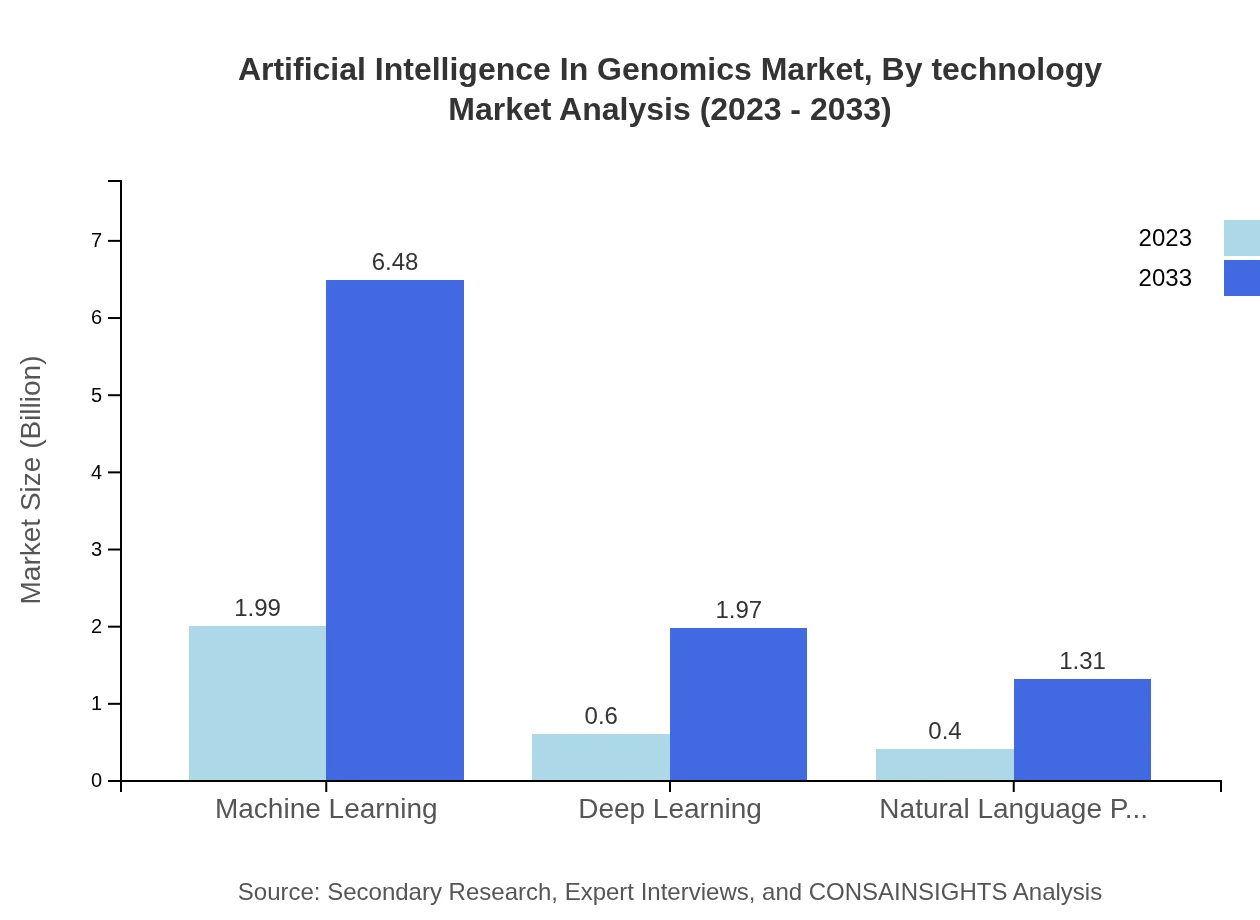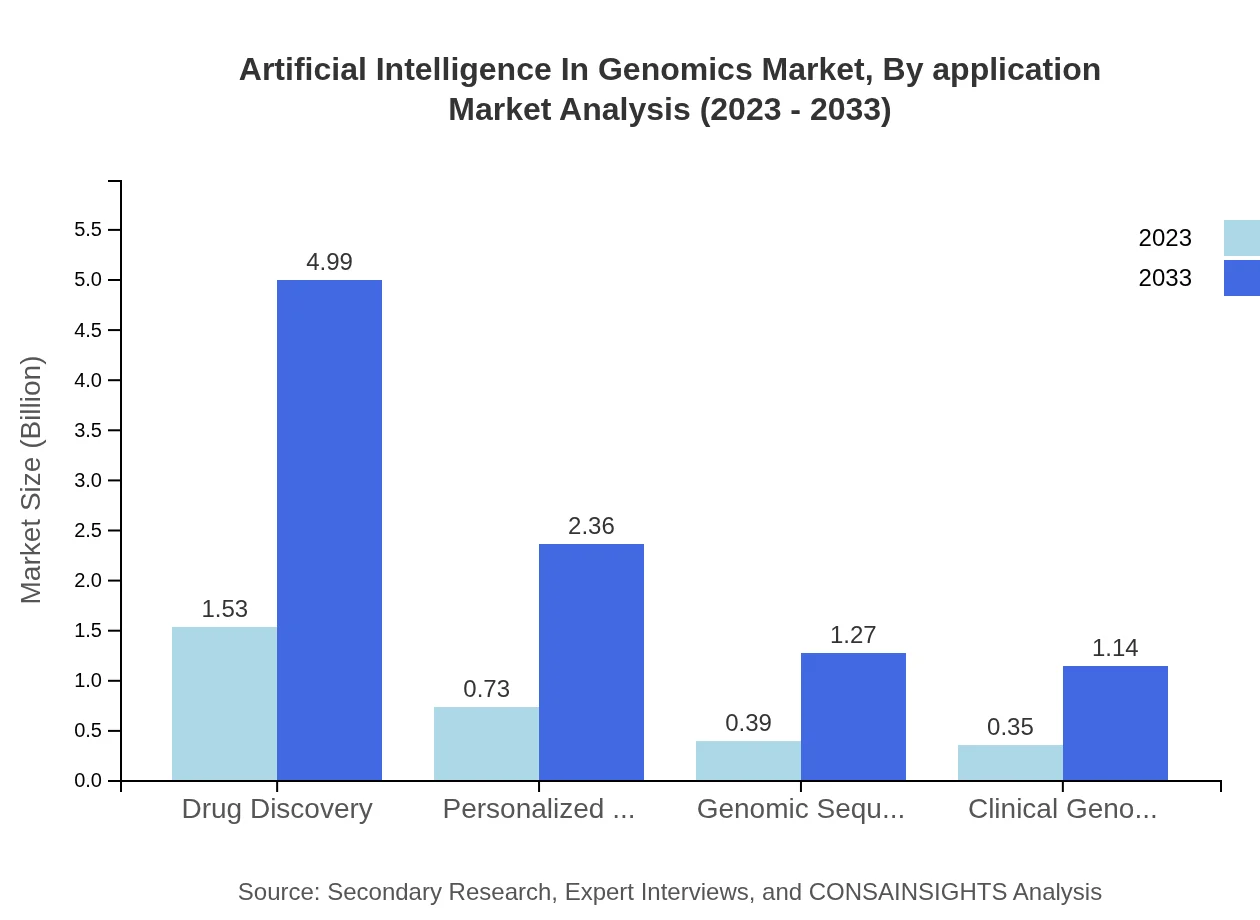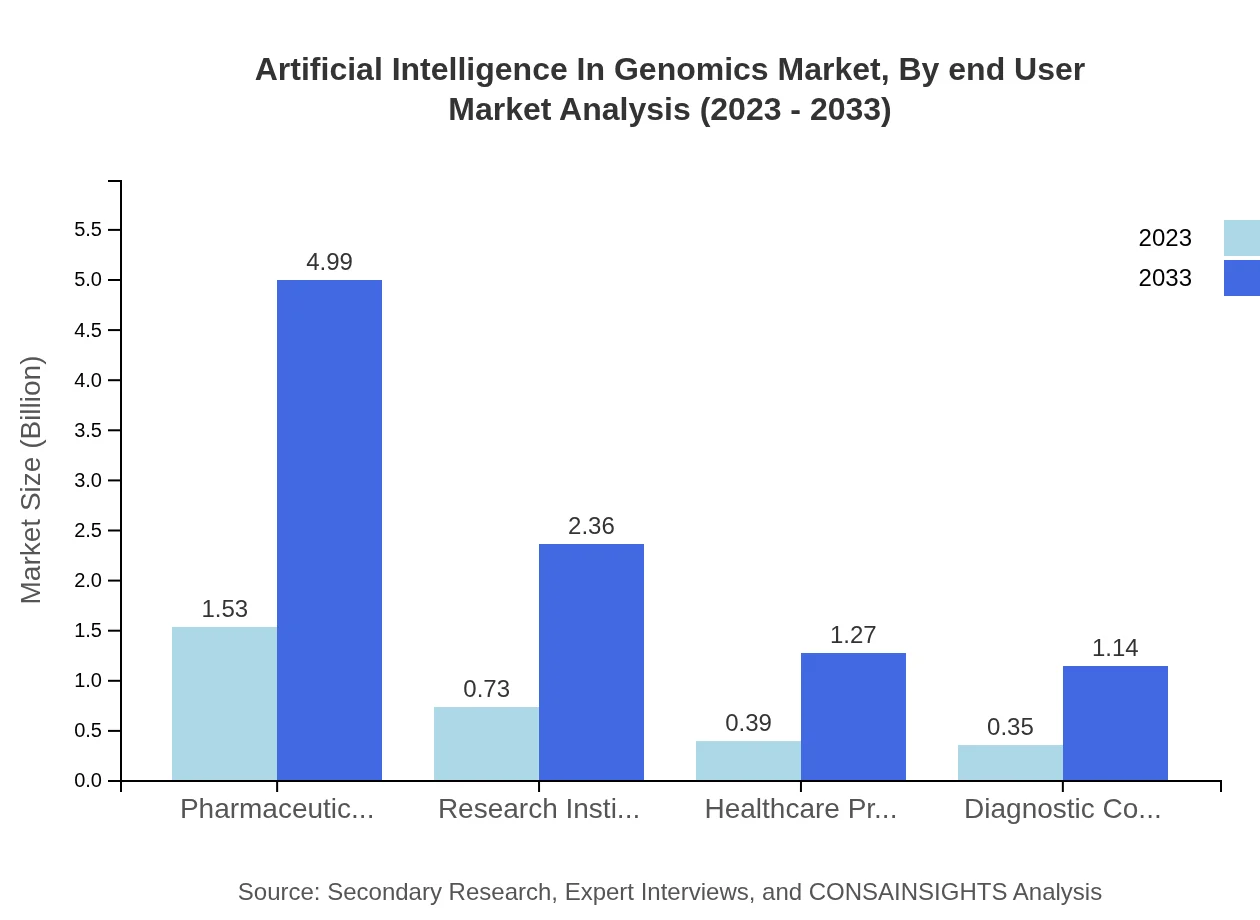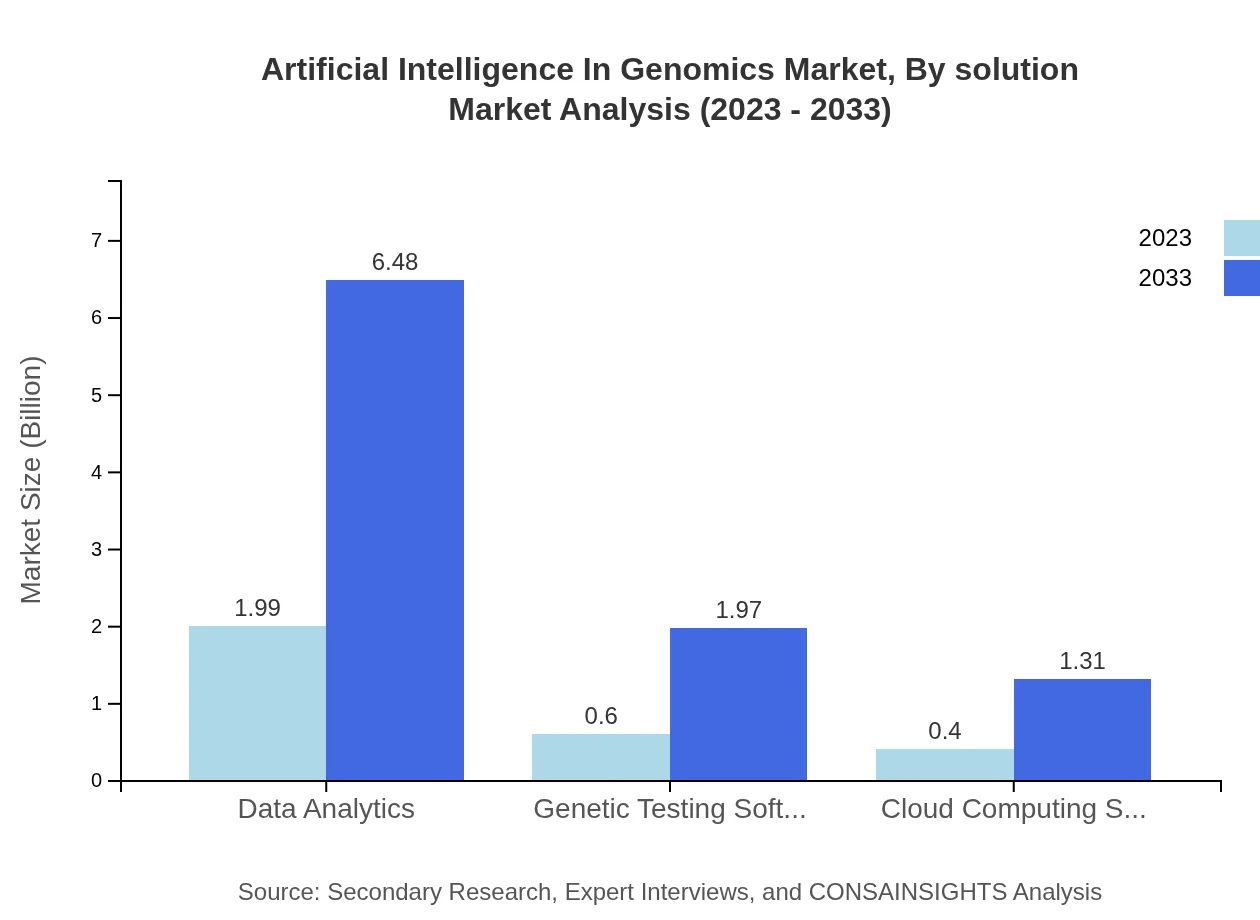Artificial Intelligence In Genomics Market Report
Published Date: 31 January 2026 | Report Code: artificial-intelligence-in-genomics
Artificial Intelligence In Genomics Market Size, Share, Industry Trends and Forecast to 2033
This report provides a comprehensive analysis of the Artificial Intelligence in Genomics market from 2023 to 2033, exploring market size, growth rates, industry trends, regional insights, and key players influencing the sector.
| Metric | Value |
|---|---|
| Study Period | 2023 - 2033 |
| 2023 Market Size | $3.00 Billion |
| CAGR (2023-2033) | 12% |
| 2033 Market Size | $9.76 Billion |
| Top Companies | Illumina, Inc., Thermo Fisher Scientific Inc., Edgewise Therapeutics, Inc., Bristol Myers Squibb Company, Deep Genomics |
| Last Modified Date | 31 January 2026 |
Artificial Intelligence In Genomics Market Overview
Customize Artificial Intelligence In Genomics Market Report market research report
- ✔ Get in-depth analysis of Artificial Intelligence In Genomics market size, growth, and forecasts.
- ✔ Understand Artificial Intelligence In Genomics's regional dynamics and industry-specific trends.
- ✔ Identify potential applications, end-user demand, and growth segments in Artificial Intelligence In Genomics
What is the Market Size & CAGR of Artificial Intelligence In Genomics market in 2033?
Artificial Intelligence In Genomics Industry Analysis
Artificial Intelligence In Genomics Market Segmentation and Scope
Tell us your focus area and get a customized research report.
Artificial Intelligence In Genomics Market Analysis Report by Region
Europe Artificial Intelligence In Genomics Market Report:
The European market for Artificial Intelligence in Genomics is anticipated to rise from $0.79 billion in 2023 to $2.56 billion by 2033. Key factors include supportive regulatory frameworks and increased emphasis on genomic research funded by both public and private sectors across European nations.Asia Pacific Artificial Intelligence In Genomics Market Report:
The Asia Pacific region is expected to experience substantial growth in the Artificial Intelligence in Genomics market, from $0.57 billion in 2023 to $1.86 billion by 2033. This growth is driven by increasing investments in healthcare technology and rising genomics research activities in countries like China and India, alongside a surge in personalized medicine adoption.North America Artificial Intelligence In Genomics Market Report:
North America continues to be a leading region in the Artificial Intelligence in Genomics market, forecasted to escalate from $1.17 billion in 2023 to $3.79 billion by 2033. The presence of significant biotech firms, robust healthcare infrastructure, and a well-established ecosystem for innovation underline this growth.South America Artificial Intelligence In Genomics Market Report:
The South America market for Artificial Intelligence in Genomics is projected to grow from $0.24 billion in 2023 to $0.78 billion by 2033. The region's expansion is supported by governmental initiatives to promote health technology and growing collaborations between local and international biotech firms.Middle East & Africa Artificial Intelligence In Genomics Market Report:
In the Middle East and Africa, the market is projected to grow from $0.24 billion in 2023 to $0.77 billion by 2033. This region is witnessing a gradual adoption of AI technologies as healthcare systems progress towards embracing genomics and precision medicine.Tell us your focus area and get a customized research report.
Artificial Intelligence In Genomics Market Analysis By Technology
The technology segment within the Artificial Intelligence in Genomics market showcases strong traction for machine learning and deep learning methods. In 2023, machine learning technology holds a significant market share, valued at $1.99 billion, expected to grow to $6.48 billion by 2033. Deep learning technologies also display promising growth, increasing from $0.60 billion in 2023 to approximately $1.97 billion by 2033.
Artificial Intelligence In Genomics Market Analysis By Application
The application sector is predominantly led by drug discovery and personalized medicine, holding a remarkable combined share. Drug discovery is anticipated to grow from $1.53 billion in 2023 to $4.99 billion by 2033, maintaining a share of 51.1%. Similarly, personalized medicine projects a growth trajectory from $0.73 billion to $2.36 billion during the same timeframe.
Artificial Intelligence In Genomics Market Analysis By End User
Pharmaceutical and biotechnology companies are the largest end-users in this market, with a size of $1.53 billion in 2023, projected to expand to $4.99 billion by 2033. Research institutions, making up 24.23% of the market share, are expected to see growth from $0.73 billion to $2.36 billion in the same period.
Artificial Intelligence In Genomics Market Analysis By Solution
The solution landscape is diverse, focusing on cloud computing solutions and genetic testing software, alongside data analytics. The data analytics segment dominates with a forecast size of $1.99 billion in 2023, projected to scale to $6.48 billion by 2033, accounting for 66.41% of the market.
Artificial Intelligence In Genomics Market Analysis By Region
Global Artificial Intelligence in Genomics, By Region Market Analysis (2023 - 2033)
Regional analyses demonstrate that North America leads in overall market size, while Asia Pacific shows the fastest growth rate. Europe is characterized by investments in genomics infrastructure, and South America is gradually increasing traction through local collaborations in biotechnology.
Artificial Intelligence In Genomics Market Trends and Future Forecast
Tell us your focus area and get a customized research report.
Global Market Leaders and Top Companies in Artificial Intelligence In Genomics Industry
Illumina, Inc.:
A leading developer, manufacturer, and marketer of life science tools and integrated systems for the analysis of genetic variation and function.Thermo Fisher Scientific Inc.:
Provides a broad range of analytical instruments, reagents, and consumables for scientific research and clinical diagnostics.Edgewise Therapeutics, Inc.:
A biotechnology company focused on discovering and developing novel therapies for patients with genetic diseases.Bristol Myers Squibb Company:
A global biopharmaceutical company engaged in discovering, developing, and delivering innovative medicines for patients.Deep Genomics:
An AI-based genomics company building the future of medicine by discovering and developing therapies for genetic disorders.We're grateful to work with incredible clients.









FAQs
What is the market size of artificial Intelligence In Genomics?
The artificial intelligence in genomics market is projected to grow from $3 billion in 2023 to an estimated size by 2033, driven by a CAGR of 12%. The increasing integration of AI technologies in genomics is enhancing research and therapeutic applications.
What are the key market players or companies in this artificial Intelligence In Genomics industry?
Key players in the artificial intelligence in genomics market include pharmaceutical and biotechnology companies, diagnostic firms, as well as research institutions that leverage AI for genomic analysis and drug discovery, shaping industry growth and innovation.
What are the primary factors driving the growth in the artificial Intelligence In Genomics industry?
Growing demand for personalized medicine, advancements in AI and machine learning technologies, and increased genomic data accessibility are primary factors driving growth in the artificial intelligence in genomics industry.
Which region is the fastest Growing in the artificial Intelligence In Genomics?
The North America region is the fastest-growing market for artificial intelligence in genomics, expected to increase from $1.17 billion in 2023 to $3.79 billion by 2033, fueled by technological advancements and robust healthcare infrastructure.
Does ConsaInsights provide customized market report data for the artificial Intelligence In Genomics industry?
Yes, ConsaInsights offers customized market report data tailored to the specific needs of clients in the artificial intelligence in genomics industry, enabling businesses to make informed strategic decisions.
What deliverables can I expect from this artificial Intelligence In Genomics market research project?
Deliverables from this market research project include comprehensive reports detailing market size, segmentation analysis, growth trends, competitive landscape, and region-specific insights tailored to the artificial intelligence in genomics industry.
What are the market trends of artificial Intelligence In Genomics?
Key trends in the artificial intelligence in genomics market include increased investment in AI-driven drug discovery, a focus on personalized medicine, and expanding use of machine learning algorithms for genomic data analysis, enhancing research capabilities.

